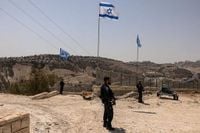On August 20, 2025, Israel’s government signed off on an especially contentious project: a massive expansion of Jewish settlements in the West Bank, specifically in the E1 area, a wedge of land east of Jerusalem. The decision, which had been frozen for years under international pressure, has sparked a wave of condemnation from governments and advocacy groups worldwide, with many warning that it could dash any remaining hopes for a future Palestinian state.
The project at the heart of the uproar involves the construction of approximately 3,400 new homes—some reports say 3,500—on land that sits between the Israeli settlement of Ma’ale Adumim and the Palestinian town of Eizariya. According to Bloomberg, the planning committee’s approval effectively greenlights a plan that will physically link Ma’ale Adumim to Jerusalem, bisecting the West Bank in the process. For many observers, this is no small bureaucratic matter; it is a move with the potential to radically alter the geography, politics, and daily realities of the region.
Why does this sliver of land—E1—matter so much? As NPR reports, E1 is one of the last geographical corridors connecting the major Palestinian cities of Ramallah in the north and Bethlehem in the south. These cities are only 22 kilometers (about 14 miles) apart as the crow flies, but for Palestinians, the journey between them is anything but direct. Due to existing Israeli settlements and a labyrinth of checkpoints, travelers are forced to take long detours that can stretch a short trip into hours of frustration. The hope, for many Palestinians and their supporters, was that this corridor would someday serve as a vital artery in a future Palestinian state.
Instead, critics say, the new settlement project threatens to block that possibility altogether. Peace Now, an organization that closely tracks settlement activity in the West Bank, did not mince words: "The settlement in E1 has no purpose other than to sabotage a political solution." The group added, "While the consensus among our friends in the world is to strive for peace and a two-state solution, a government that long ago lost the people's trust is undermining the national interest, and we are all paying the price." (NPR)
For the Israeli government, however, the move is a deliberate signal. Far-right Finance Minister Bezalel Smotrich, himself a former settler leader, cast the approval as a direct rebuke to Western countries that have recently announced plans to recognize a Palestinian state. Speaking at a press conference near Ma’ale Adumim, Smotrich declared, "The Palestinian state is being erased from the table not with slogans but with actions. Every settlement, every neighborhood, every housing unit is another nail in the coffin of this dangerous idea." (NPR)
The approval didn’t stop with E1. During the same meeting, Israel’s planning committee also gave the green light to 350 new homes in the settlement of Ashael, near Hebron. It’s another sign, say critics, of how settlement expansion has become a central pillar of the current Israeli government’s agenda. As noted by Bloomberg, the government is dominated by religious and ultranationalist politicians, many of whom have deep ties to the settlement movement. Smotrich himself has been granted Cabinet-level authority over settlement policy and has vowed to double the settler population in the West Bank.
Numbers tell part of the story. More than 700,000 Israeli settlers now live in the West Bank and east Jerusalem, according to NPR. That’s a figure that has steadily climbed over the decades, despite repeated international calls for a freeze on settlement activity. The international community—including the United Nations and the European Union—overwhelmingly considers Israeli settlement construction in occupied territory to be illegal under international law and a major obstacle to peace.
The E1 plan has been in the works for over twenty years. It was repeatedly shelved or delayed, often under pressure from the United States and other allies concerned about its impact on the peace process. But the current Israeli leadership, headed by Prime Minister Benjamin Netanyahu, has made its intentions clear. Netanyahu has long rejected the idea of a Palestinian state alongside Israel and has vowed to maintain open-ended control over the West Bank, annexed east Jerusalem, and the war-ravaged Gaza Strip—all territories seized by Israel in the 1967 war and claimed by Palestinians for their future state.
"Talk of a two-state solution is not a high priority," said U.S. Ambassador to Israel Mike Huckabee in an interview with the Associated Press, reflecting a shift in American diplomatic posture in recent years. The State Department, for its part, did not immediately respond to requests for comment on the latest settlement approvals.
For Palestinians, the expansion signals an increasingly dire reality. The world’s focus may be on the ongoing war in Gaza, but in the West Bank, daily life has become more fraught. NPR reports a marked increase in attacks by settlers on Palestinians, evictions from Palestinian towns, Israeli military operations, and ever-tightening restrictions on movement. There have also been several Palestinian attacks on Israelis, further fueling tensions.
If the E1 project moves quickly, infrastructure work could begin within the next few months, with actual construction of homes starting in about a year. While Israel could, in theory, remove settlements as it did in Gaza in 2005, such a move seems almost unimaginable today given the current political landscape and strong support for settlements across much of the Israeli government—and even among some opposition parties.
For many on the ground, the approval of E1 is more than just another line on a map—it’s a tipping point. The move has been widely condemned by international governments, who see it as a death blow to the already fragile prospects for a negotiated two-state solution. Yet for supporters of the settlement enterprise, it’s a victory, a concrete assertion of Israeli sovereignty and a rejection of what they view as dangerous illusions about Palestinian statehood.
The coming months will reveal whether the E1 project proceeds as quickly as planned—and what ripple effects it may have on the region’s already volatile politics. For now, the approval stands as a stark reminder of how decisions made in committee rooms and press conferences can reshape lives, redraw boundaries, and recalibrate the hopes of millions.




